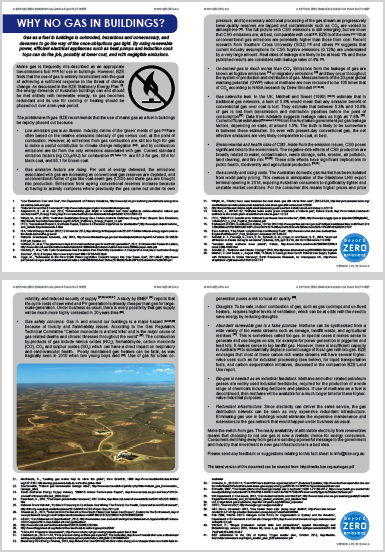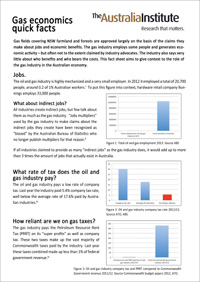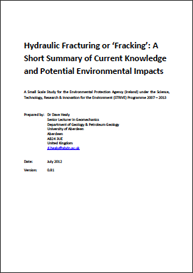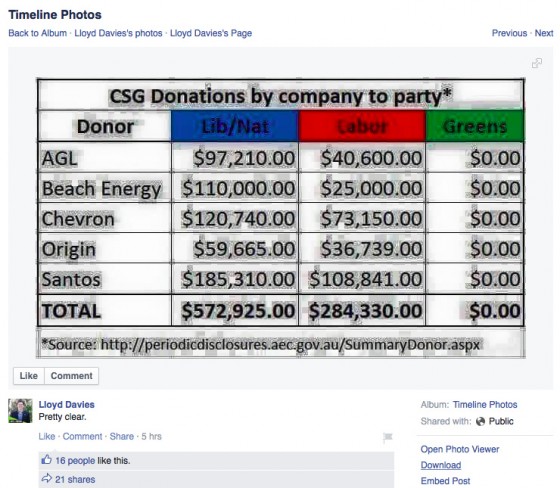» Fact sheets – independent organisation’s information about gas
» Reports and studies that you should know about
» What the gas industry and governments are saying
Fact sheets
Beyond Zero Emissions’ gas fact sheet

» Read Beyond Zero Emissions’ info-flyer about gas
Australia Institute’s gas fact sheet
 Gas fields covering NSW farmland and forests are approved largely on the basis of the claims they make about jobs and economic benefits. The gas industry employs some people and generates economic activity, but often not to extent claimed by industry advocates.
Gas fields covering NSW farmland and forests are approved largely on the basis of the claims they make about jobs and economic benefits. The gas industry employs some people and generates economic activity, but often not to extent claimed by industry advocates.
This fact sheet will assist with arguing against the industry’s shonky economics.
» Download the Gas Fact Sheet
» Read more on www.tai.org.au
» More fact sheets – Independent organisation’s information
Reports and studies
Here is a fantastic resource. Its the literature review of the latest science on shale gas impacts, its great for flicking through to find the peer reviewed paper that addresses risks or pollution events, when you’re having an debate with someone or writing a letter etc.
» www.psehealthyenergy.org/site/view/1233
And here is a great database that links to those papers:
» www.zotero.org/groups/pse_study_citation_database/items
VICTORIA
Victorian Auditor General: report
“Communities across Gippsland and Western Victoria are relieved and heartened that today’s Victorian Auditor General’s report has warned the government that well recognised risks may make unconventional gas mining unsuitable for Victoria because of it’s dense population, scarce water resources, and high reliance on agriculture.
The report, called ‘Unconventional Gas: Managing Risks and Impacts’, released this morning, outlines that “substantial national and international studies have comprehensively identified the potential and known risks that unconventional gas poses to the environment and the community … Environmental and social values are integral to this conversation if we are to avoid a damaging legacy in years to come.”
It points out the gross inadequacy of the current regime for regulating earth resources, stating “the regime has too few environmental controls, and weak consideration of the competing interests for land involved and potential social impacts”.”
Friends of the Earth media release, 19 August 2015, ‘Communities heartened by Auditor General’s warning of potential “damaging legacy” over unconventional gas mining’
The Auditor General’s report has come out and it couldn’t be more positive, short of calling for a ban themselves.
» Find the report on www.audit.vic.gov.au
USA
The official report that made New York ban fracking
Over 2,000 pages of comprehensive research. Although from America, essentially it is still relevant to Victoria and elsewhere.
The massive study finds that health, safety and environmental uncertainties regarding fracking’s dangers have ‘grown worse over time.’
The SEQR Findings Statement for high-volume hydraulic fracturing (HVHF) was issued on 29 June 2015. It concluded the Department of Environmental Conservation’s comprehensive, seven-year review and officially prohibits high-volume hydraulic fracturing in New York.
» Find the full report Volume 1 and Volume 2 here:
High-Volume Hydraulic Fracturing in NYS
» Article about the report in Inside Climate News:
Why Did NY Ban Fracking? The Official Report Is Now Public
» A Public Health Review of High Volume Hydraulic Fracturing for Shale Gas Development (PDF)
NEW SOUTH WALES
Final Report of the Independent Review of Coal Seam Gas Activities in NSW
In September 2014, the NSW Chief Scientist delivered her final report on coal seam gas (CSG) to the NSW government, and the news isn’t good. CSG will have ‘unintended consequences’ and it’s our land, water and communities that will be left to pick up the pieces.
» See the report: ‘Final Report of the Independent Review of Coal Seam
Gas Activities in NSW’ (PDF, 23 pages)
» Read more about the report on www.members.landwaterfuture.org.au
EUROPE
European report: ‘Fracking should be temporarily banned’
Fracking poses ‘significant’ risk to humans and should be temporarily banned across EU, says new report
A major new scientific study has concluded that the controversial gas extraction technique known as fracking poses a “significant” risk to human health and British wildlife, and that an EU-wide moratorium should be implemented until widespread regulatory reform is undertaken.
The damning report by the CHEM Trust, the British charity that investigates the harm chemicals cause humans and wildlife, highlights serious shortcomings in the UK’s regulatory regime, which the report says will only get worse as the Government makes further budget cuts.
It also warns of severe risks to human health if the new Conservative government tries to fast-track fracking of shale gas across the UK. The “scale of commercial fracking” unleashed by the Government’s eagerness to exploit the technique “should not be underestimated”, it cautions.
» Read more on www.independent.co.uk
UNITED KINGDOM
Government report: Fracking impact on water quality
Fracking operations to extract shale gas in Britain could cause nearby house prices to fall by up to 7% and create a risk of environmental damage, according to a government report that has been published in full for the first time.
Entitled ‘Shale Gas Rural Economy Impacts’, the Department for Environment, Food & Rural Affairs (Defra) document was released on 1 July 2015 after a freedom of information battle.
An official assessment of the impact of fracking, it warned that leakage of waste fluids could affect human health through polluted water or the consumption of contaminated agricultural products.
» The Guardian – 2 July 2015:
Fracking could hurt house prices, health and environment, official report says
IRELAND
Report seeking ‘robust foundation for informed decision’
 Report: Hydraulic Fracturing or ‘Fracking’: A Short Summary of Current Knowledge and Potential Environmental Impacts
Report: Hydraulic Fracturing or ‘Fracking’: A Short Summary of Current Knowledge and Potential Environmental Impacts
A Small Scale Study for the Environmental Protection Agency (Ireland) under the Science, Technology, Research & Innovation for the Environment (STRIVE) Programme 2007 – 2013
Summary
“Published peer-reviewed data suggest that there is a low and probably manageable risk to ground water from fracking, whereas the potential impacts on the atmosphere from associated methane emissions and the risks of increased seismicity are less well known.
However, the total number of published, peer-reviewed scientific studies remains low, and it is therefore prudent to consider and research in detail the full range of possible risks from fracking operations, including their magnitudes and uncertainties, and the potential environmental impacts of these risks in the exploitation of shale gas. The published reports (MIT, 2011; University of Texas, 2012) and those due to be published by the US EPA, a new EU Working Group on Shale Gas Regulation, and the International Energy Agency, will together provide a richer and more robust foundation for informed decision making in Europe.
Much of the coverage to date in the traditional media and on the World Wide Web is not peer-reviewed and is often misinformed.
Critical evaluations of shale gas fracking and the potential impacts on the environment must be based on peer-reviewed, scientific analyses of quantitative data. Agencies responsible for regulating or monitoring the environmental impacts of shale gas development need to be at the forefront of this effort (SEAB, 2011a). The design of any national regulatory framework to protect the environment from hydraulic fracturing operations should start with the supranational European Union directives and recommendations from working groups in progress.”
» See the 26-page peer-reviewed report: www.epa.ie
USA
Chemicals in natural gas operations
By Dr Theo Colborn
• Introduction
• Videos and Webinars
• Photos
• Health
• Chemicals
• Air Pollution
• Peer-reviewed Papers
• Links to More Info
Fracking information and resources
Friends of the Earth UK’s Key information on fracking and shale gas, plus: Legal and planning documents:
USA
Report about fracking wastewater
113 pages – May 2012: ‘In Fracking’s Wake: New Rules are Needed to Protect Our Health and Environment from Contaminated Wastewater’
Published by Natural Resources Defense Council, USA
This paper analyzes the problem of wastewater generated from the hydraulic fracturing process of producing natural gas, particularly with regard to production in the Marcellus Shale. It shows that, while hydraulic fracturing (often called “hydrofracking” or “fracking”) generates massive amounts of polluted wastewater that threaten the health of our drinking water supplies, rivers, streams, and groundwater, federal and state regulations have not kept up with the dramatic growth in the practice and must be significantly strengthened to reduce the risks of fracking throughout the Marcellus region and elsewhere.
The report combines an evaluation of federal and state laws regulating fracking wastewater with a thorough review, compiled for NRDC by an independent scientist, of the health and environmental risks posed by this high-volume waste stream and the currently available treatment and disposal methods. It finds that the currently available options are inadequate to protect human health and the environment.
States that are considering fracking should not move forward until the available wastewater disposal options are fully evaluated and safeguards are in place to address the risks and impacts identified in this report.
USA
American report: ‘The Urgent Case for a Ban on Fracking’
In recent years, the term “fracking” has come to mean far more than just the specific process of extracting oil and natural gas by injecting large volumes of various mixes of water, sand and chemicals deep underground, at extreme pressure, to create fractures in targeted rock formations.
Today, the term “fracking” represents the host of problems that this dangerous practice entails. This report details evidence on the many reasons why fracking should be banned, including:
• Producing massive volumes of toxic and radioactive waste. The disposal of this waste is causing earthquakes and putting drinking water resources at risk.
• Pumping hazardous pollutants into the air. Fracking utilizes over 100 dangerous chemicals known to cause life-threatening illnesses, including cancer.
• Destabilizing the climate. Fracking wells release large amounts of methane gas, which is known to trap 87 times more heat than carbon dioxide in the atmosphere and contributes greatly to global warming.
• Disrupting local communities. Fracking presents a broad number of consequences for people living in areas where it is occurring, including damage to public roads, declines in property value, increased crime and an increased demand on emergency services.
• Turning homes into explosive hazards. Contaminating water wells with methane and other flammable gases from fracking puts families’ health, safety and property at high risk.
• Causing thousands of accidents, leaks and spills. More than 7,500 accidents related to fracking occurred in 2013, negatively impacting water quality in rivers, streams and shallow aquifers.
» Download the report here: www.documents.foodandwaterwatch.org (PDF)
A flaring fact
The World Bank, which launched a Global Gas Flaring Reduction Partnership in 2002, estimates that each year 140 billion cubic metres of natural gas produced together with oil are burned or flared at thousands of oil fields worldwide − adding 350 million tonnes of carbon dioxide emissions to the atmosphere.
Fracking in a global perspective
SkyTruth Global Flaring Map Demo
Published on youtube.com on 12 May 2014
See one of the consequences of onshore gas extraction in a global perspective.

